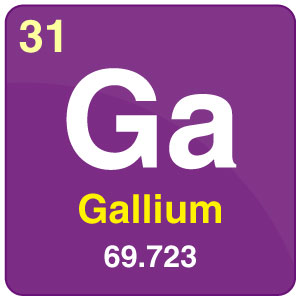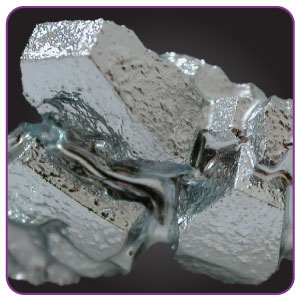Gallium

| Symbol | Ga |
| Atomic Number | 31 |
| Atomic Mass | 69.72 g.mol -1 |
| Discovered by | Paul-Émile Lecoq de Boisbaudran |

Table of Contents
- Chemical Properties Of Gallium
- What is Gallium?
- Uses Of Gallium
- Properties Of Gallium
- Certain Facts About Gallium
- Gallium is a chemical element with atomic number 31. Solid gallium is a blue-grey metal having an orthorhombic crystalline structure, whereas very pure gallium is coated with stunning silvery colour.
- It does not exist in pure form in nature, and its compounds do not act as a primary source of extraction
- It is used in blue-ray technology, blue and green LEDs, mobile phones and pressure sensors for touch switches.
- Gallium nitride acts as a semiconductor. It consists of certain properties that make it very versatile.
- This metal can be easily extracted as a by-product from iron pyrites, zinc blende, germanite, and bauxite.
- It is solid at room temperature but when it comes in contact with caesium, mercury, and rubidium, it becomes liquid (when heated slightly).
- This element has been considered as a possible heat exchange medium in nuclear reactors.
- When Gallium is added to certain metals it causes them to become brittle.
- Gallium has one of the largest ranges in which it is a liquid when compared to other metals.
Chemical Properties Of Gallium
| Group | 13 | Melting point | 29.8 °C |
| Period | 4 | Boiling point | 2204 °C |
| Block | p | Density (g cm−3) | 5.91 |
| Atomic number | 31 | Relative atomic mass | 69.723 u |
| State at 20°C | Solid | Key isotopes | 69Ga |
| Electron configuration | [Ar] 3d104s24p1 | CAS number | 7440-55-3 |
| ChemSpider ID | 4514603 | ChemSpider is a free chemical structure database | |

Comments